To contribute to our customer’s “Safety & Reliability”

Senior Executive Operating Officer
General Manager, Digital Innovation Division
Kenji Tomooka
We are currently implementing a new management strategy in accordance with our “Continuity and Change” philosophy. “Safety & Reliability” are one of the elements that constitute the “Continuity,” the fundamental quality we should continue to pursue now and in the future without change. Fujitec’s DX is aimed at contributing to the safety and security. We are promoting our DX efforts based on the concept of “Change”—in other words, innovative initiatives designed to create new Fujitec—which is intended to update products, services, and business processes by making use of ever-evolving digital technology.
Fujitec’s DX vision is to realize a digital twin—a mirror image of the real world expressed in digital form that makes it possible to simulate reality as well as collect and optimize data in real time. As this enables efficient monitoring and projection, we aim to utilize the technology to enhance the customer experience by virtually linking products, services such as maintenance and repair, relevant employees, and our customers and users together on the same platform.
We believe that there are two major areas where the experience itself can be digitally improved through business transformation.
The first one is the enhancement of customer experience transformation. This involves understanding who are the intended users of the space mobility systems, improving customer profiling, and diversifying services to cater to different types of users.
For instance, we offer “Elemori”, a web-based free service that allows building managers to check operational status and other information on their computers and smartphones. We are looking to expand our information provision services using social tools that enable elevator and escalator users to check periodic inspection information and disaster recovery information from their smartphones.
The second area pertains to the transformation of the corporate and employee experience.This means taking a bird’s-eye view of the four layers of technology, processes, systems, and culture to resolve bottlenecks. Simply changes IT systems isn’t sufficient; we are creating more opportunities for our employees to leverage digital tools on their own to ensure business improvement and growth. We hope that, by improving our employees’ work quality and productivity, we can offer even better customer service.
For example, when we launched a company-wide paperless initiative, we had internal procedures and regulations that necessitated the use of seals, alongside the corporate culture that viewed seal impressions as essential for maintaining proper politeness. Thus, we undertook a thorough transformation of these through the application of BPR. Given that the mindset of employees significantly influences this kind of business process reengineering, we prioritize the education and awareness of our workforce when implementing the initiative.
The engine that powerfully drives these two transformations is the strategic use of generative AI. Rather than relying on any single technology, we have built a three-pronged framework that provides employees with three cutting-edge generative AI options: ChatGPT, Gemini, and Claude*. This approach reflects our strategic intent—not to predict the future of rapidly changing technology trends but to remain adaptable to all possibilities and consistently apply the best available tools in our operations.
Under this framework, we are not only improving company-wide operational efficiency but also driving innovation in our development processes and cultivating a culture that encourages employees to independently develop their skills through self-learning. By strengthening individual capabilities in this way, we aim to further enhance the quality of customer service.
*ChatGPT, Gemini, and Claude are registered trademarks of OpenAI OpCo, LLC; Google LLC; and Anthropic PBC, respectively.
At Fujitec, we adopt a hybrid strategy that balances in-house development of core systems supporting our business foundation with the proactive use of high-quality external cloud services for more general business areas.
To further accelerate this approach, in fiscal year 2025, we introduced a total of ten new services, including Salesforce, Sansan, and Cloudflare*. We are pursuing proactive DX initiatives to enhance customer experience through faster customer response with Salesforce and improved sharing of professional network information via Sansan. At the same time, we are advancing resilient DX initiatives to ensure network security and performance with Cloudflare. In doing so, we can maintain a balanced approach between proactive DX and resilient DX.
*Salesforce, Sansan, and Cloudflare are registered trademarks of Salesforce, Inc.; Sansan, Inc.; and Cloudflare, Inc., respectively.
Number of cloud-based services:45 servicesin FY2025
Ratio of cloud-related expenses:59%in FY2025
In Fujitec, Digital Innovation Division is responsible for promoting DX. The Division is composed of an Information Technology R&D Dept, which is responsible for R&D functions; an Information System Dept, which responsible for the development and operation of IT systems; a Process Management Dept, which responsible for business innovation; and the Information Security Control Office.
We built many of our core systems in-house. We consider this as one of our strengths, and we are committed to advancing the skills of our in-house engineers to reinforce this strength.

The Information Security Committee, for which the Information Security Management Office serves as the secretariat, established security policies and standards to protect information assets by maintaining and improving the security of All-Fujitec. The Committee also examines and deliberates on the use, handling, and management of information networks, systems, and devices to offer guidance, education, and initiatives aimed at raising awareness. Specifically, in order to strengthen the Group’s business infrastructure and improve its security levels, the Committee provides information security training based on the examples of security incidents and cyberattacks from outside the Company, conducts drills in which all employees in Japan are sent mock e-mails simulating hypothetical attacks, and carries out information security audits of our global operations. Furthermore, we have organized and put in place the Computer Security Incident Response Team (CSIRT) to respond to information security incidents and accidents. The Team is also responsible for conducting security awareness raising activities during normal times, investigating contingencies, analyzing causes, implementing recovery measures, and liaising with internal and external stakeholders. We will adapt these systems to the rapidly changing business environment and digital technology to operate our business in a manner that can make our stakeholders feel more secure.
We foster a corporate culture that puts into practice value creation, productivity improvement, and communication revitalization by enhancing the recruitment and strengthening the development of human resources who proactively promote DX by making use of data and digital technology.
Here are four specific examples.
The first one is the “Wednesday YOU GOTTA Seminar,” an online webinar open to all employees. We also provide learning opportunities for those who wish to participate freely, including hands-on training on common digital skills such as generative AI and RPA.
Secondly, we have introduced a training program designed to develop digital skills customized for different job roles and years of service, including field training that utilizes smart glasses as part of the curriculum.
Thirdly, we launched an internal learning community called “Manabi Innovation.” It is planned and operated as a place to foster employee development through communication and co-creation that transcends organizational barriers, including voluntary workshops and networking events aimed at improving business processes.
Lastly, we conduct annual IT literacy and information security tests to assess skills and raise learning awareness.
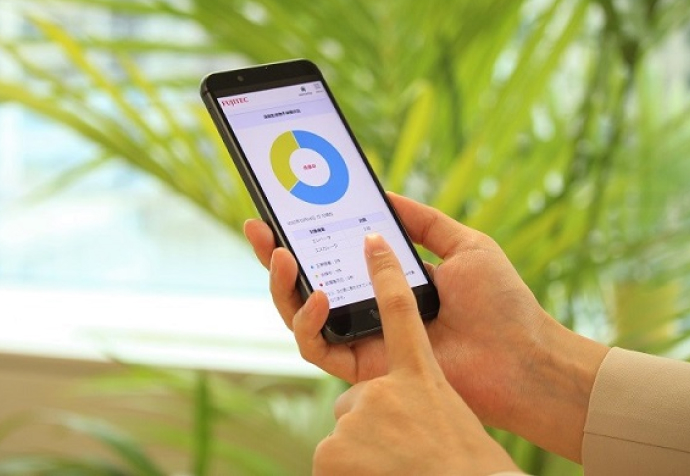
In 2022, we started offering Elemori, a web-based service that allows customers (building managers) to check the operational status of elevators and escalators via computer or smartphone. This service is offered free of charge to customers who sign maintenance contracts with us, allowing them to monitor their facilities regardless of time or location. Major functions include visualization of operational status, remote operation setting, display of inspection reports, and confirmation of scheduled inspection dates.
We intend to further broaden the range of service offerings so that users can check other types of information through social tools, including updates on restoration efforts in the event of disaster, details about outages caused by routine inspections during normal times, and the delivery history.
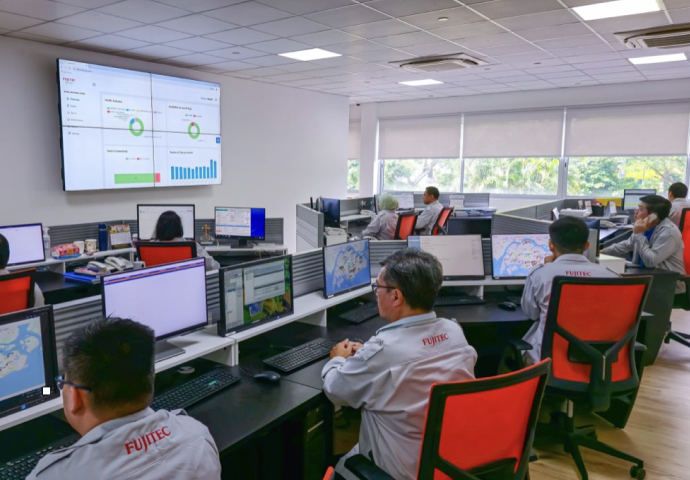
We are strengthening the overseas development of our remote monitoring system that can monitor elevator performance from a distance, which we have so far actively deployed the service in Japan. Currently, we are vigorously developing a system that enables real-time remote monitoring by saving data from the elevator’s communication modem in Amazon Web Services (AWS). In 2024, we became the first Japanese manufacturer certified under the standards for elevator maintenance through remote monitoring, a program promoted by the Singapore government.
*Amazon Web Services is a registered trademark of Amazon Technologies, Inc.
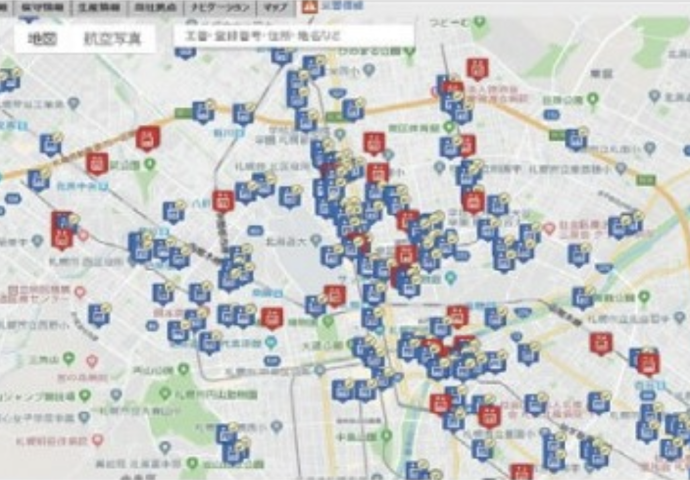
Launched in 2015, All on Maps is a platform designed to enable users to effortlessly explore data from multiple internal systems by using maps as an interface.
(See the last paragraph of this page,
titled “Winning of the FY2020 (the 38th) IT Award in the Customer/Business Function Category.”)
We have strengthened functionalities aimed at ensuring “Safety & Reliability”, including coordination with the maintenance staff safety verification system and the disaster response system, as well as the AI-based automatic route search function during wide-area disasters and breakdowns.
In the future, we aim to further advance “Safety & Reliability” by linking data to weather information and map information on flooding and lightning strikes to notify maintenance personnel in charge of properties where their elevators are expected to be shut down, thereby speeding up the initial response.
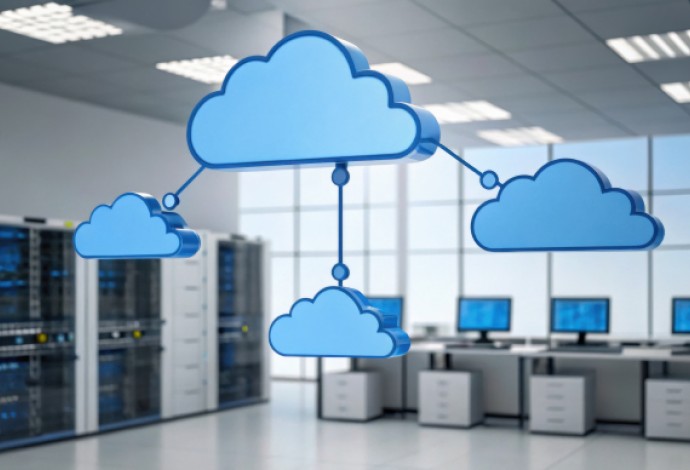
The database servers for Safenet Center, which provides round-the-clock monitoring of elevators and escalators, have been migrated to the cloud and distributed across multiple locations. By relocating the database servers from our on-premises data center previously located in our office building to the AWS data centers in Tokyo and Osaka, we significantly reduce the risk of system downtime associated with equipment failures, building damage, or large-scale disruptions. This enhances the operational continuity of the Safenet Center, enabling us to keep providing users with even greater “Safety & Reliability.” Looking ahead, we also plan to migrate the communication control servers and aim to achieve fully cloud-based remote monitoring, while reducing environmental impact through lower power consumption.
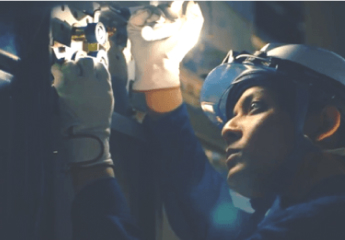
To improve the efficiency of elevator maintenance, we developed an application that speeds up the malfunction response process by analyzing past malfunction response data and informing the person in charge of appropriate actions to be taken. This helps younger employees to obtain response capabilities comparable to those of experienced staff and improves overall operational effectiveness. Pilot operations began in the Kinki area in 2019. We are now promoting efforts to improve forecast accuracy for further utilization of the application in the field.
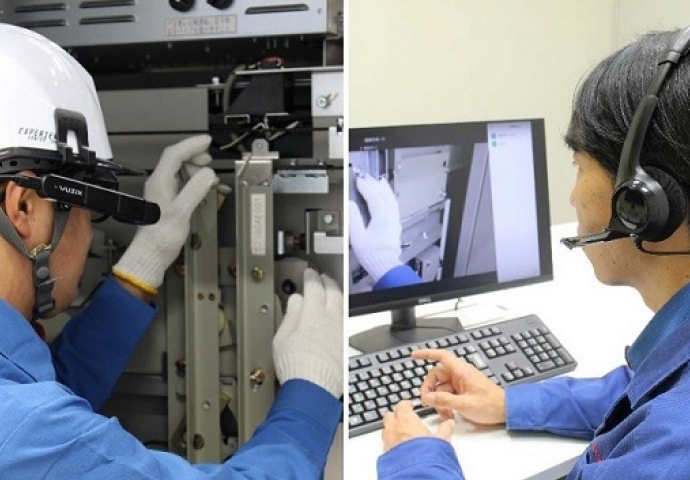
We use smart glasses to remotely perform part of safety patrol, a process to audit maintenance sites. With smart glasses, field engineers can relay hands-free video footage of the ongoing work, enabling technical experts to provide real-time guidance to the field from the office via video call. This reduced technical experts’ travel time and increased the frequency of safety patrols. These glasses are also used to develop younger technical staff by serving as a tool for technical experts to provide work tips at maintenance training sessions.
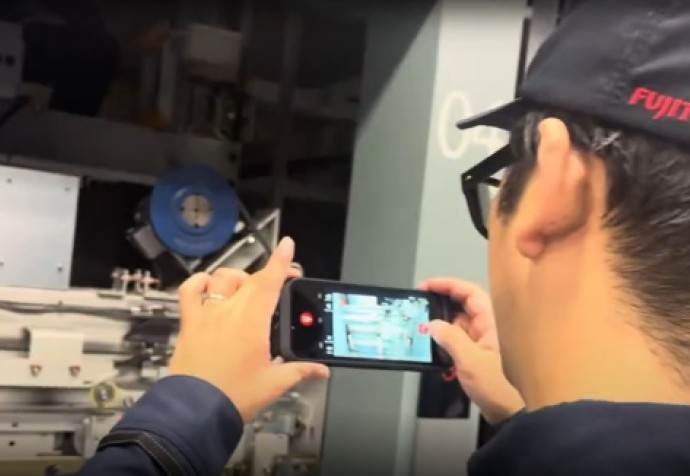
In site surveys for modernization projects involving elevators manufactured by other companies, major challenges included difficulties in sharing information such as measurement points and results, as well as the considerable time required for surveys and measurements to compensate for the lack of sufficient information in existing drawings and other materials. To address these challenges, we have developed a system that leverages 3D measurement technology to digitally capture sites and transportation routes as three-dimensional images. Through this initiative, personnel involved in the project can intuitively review and measure all aspects of the site from every angle using the 3D imagery, enabling a more efficient survey process. As a result, we were able to cut the time required for site surveys by more than half. Shorter survey times also mean reduced elevator downtime associated with these surveys, which is expected to enhance customer convenience and contribute to higher customer satisfaction.
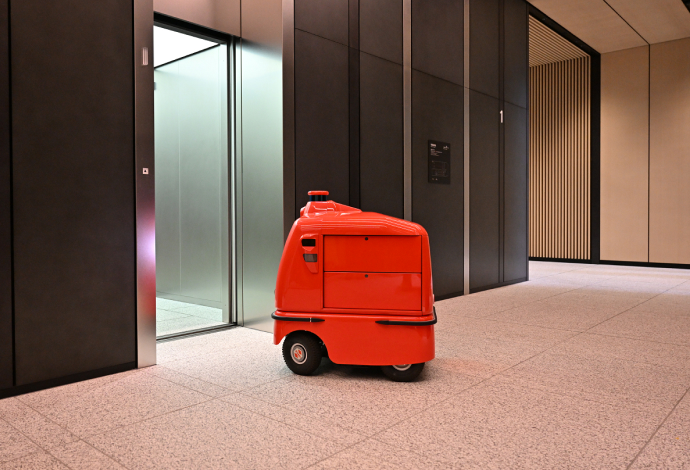
We have been working on the development of a technology that enables robots to move autonomously across different floors using elevators, while conducting proving tests and offering services in multiple facilities. Furthermore, to improve our operational efficiency, we have deployed robots in our own offices since 2023 for delivering documents and transporting plant parts. This elevator–robot coordination technology conforms to a common standard, allowing diverse types of robots to seamlessly function with elevators. We are committed to expanding the possibilities of services provided by robots to realize more comfortable and safer mobility.
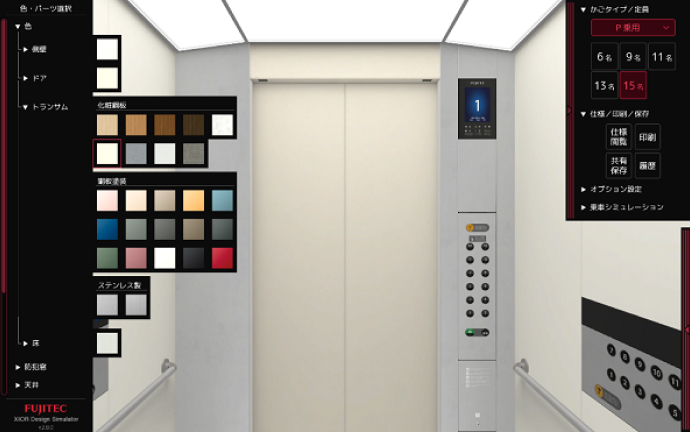
We launched the 3D design simulator named “Elevator 3D Design Simulator” in 2019. This allowed customers to visually check the elevator design in a three-dimensional form, enabling them to design or select a design with a more concrete image in mind. The simulator is available online and allows users to experiment with a variety of design options.
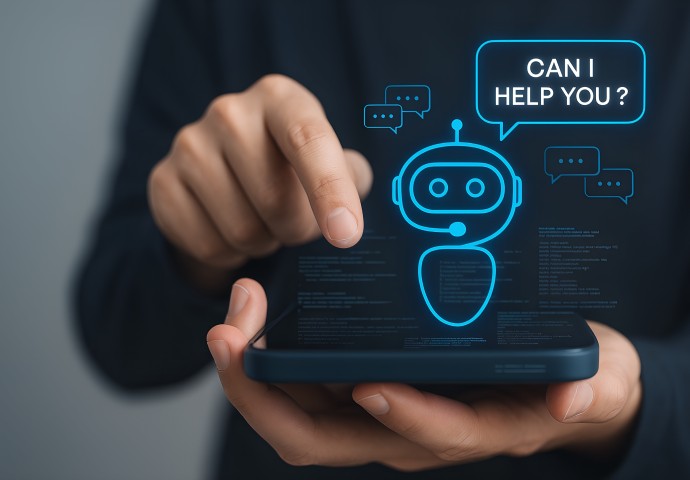
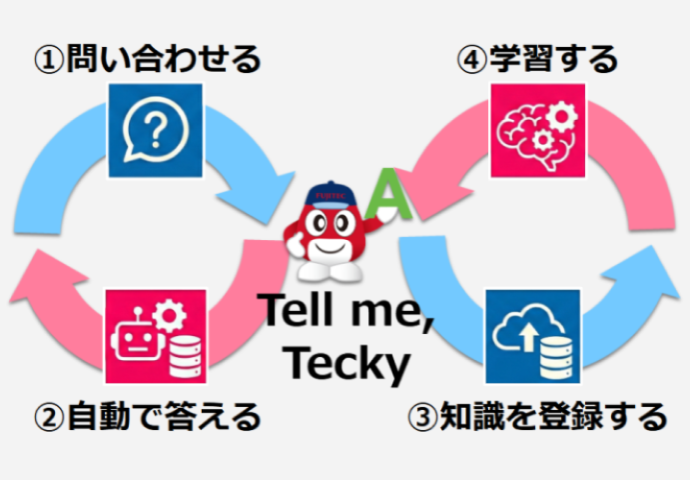
Since its deployment in 2023, more than 2,800 employees worldwide use AI. Through study sessions on AI utilization and a community for knowledge sharing, we promote the integration of AI into daily operations. As a result, we are fostering an environment where each employee can focus on more creative tasks.
*Google Workspace is a registered trademark of Google LLC.
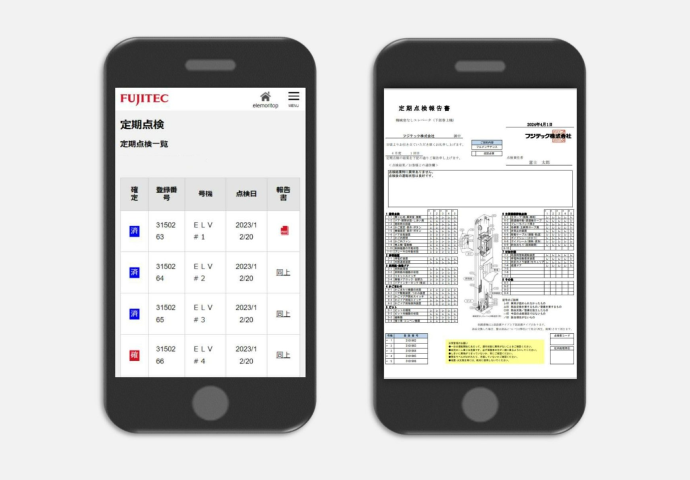
For external users, we added new paperless functions to Elemori, a free web-based service that allows customers (building managers) to check the elevator performance and other information on their computers and smartphones. By computerizing the paper-based approval seal-affixing process for periodic inspection/check reports and periodic inspection logs, we succeeded in achieving easy access to the information and reducing the administrative burden.
For internal users, we revamped our workflow that required primarily paper-based internal applications into a service that can be easily put online by employees, while holding explanatory meetings and development training for employees. This paperless initiative is participated by a number of employees from various departments.
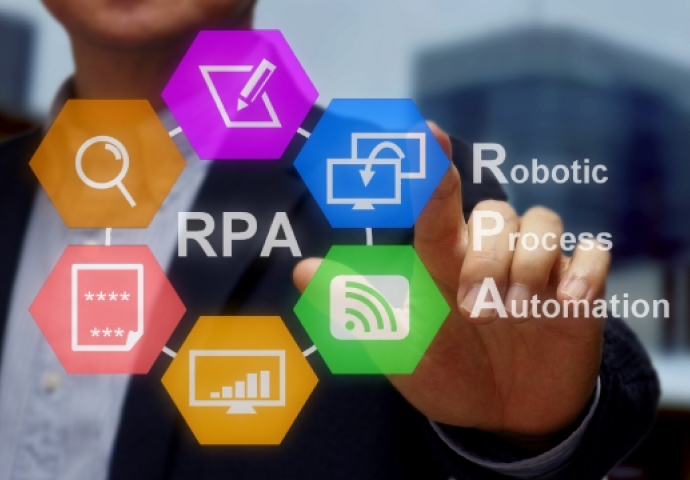
As part of our work style reform, we introduced RPA in 2019, with the aim of automating routine work, mainly in the elevator and escalator business divisions. As of September 2025, more than 170 business processes have been automated, resulting in creating a reduction of approximately 27,450 hours per year. Those who are in charge of the operations to be automated take the initiative in development. The IT division backs up the development, including by conducting online training sessions for them. This contributes to the creation of a workplace dedicated to creative, high value-added work.
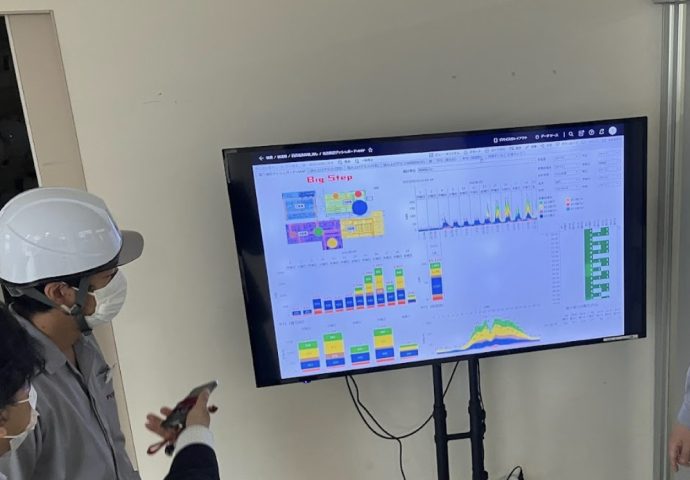
As one of our efforts to reduce environmental impact, we have developed in-house a system designed to measure and visualize the amount of electricity used in real time and are using the system at Big Step, our R&D and production base for escalators. We installed special equipment within the facility to create a power consumption database, and achieved the visualization of the amount of electricity consumed by making use of visualization tools. The measurement data is refreshed every five minutes, allowing users to see the cumulative electricity usage on a computer or a large-sized monitor in the office. Electricity consumption can be displayed by the hour, by day of the week, or by area on a map. This facilitates analysis of the relationship between power usage and business processes, helping to identify problems and improve operations.
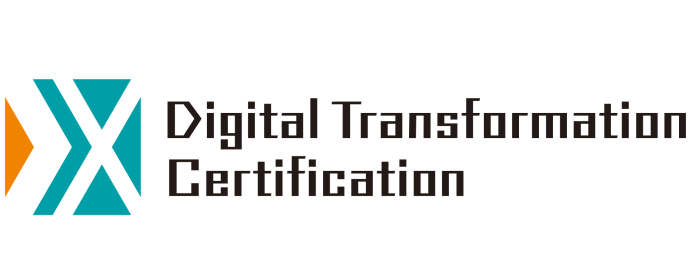
The Company was initially certified as a DX-certified operator under the DX Certification system established by Japan’s Ministry of Economy, Trade and Industry in 2013, and following the renewal examination, the certification has been updated and is now valid until February 28th, 2027.
We are promoting DX in all areas and working toward the realization of digital twin, including by introducing Elemori, a web-based service for customers (building managers), All on Maps, a comprehensive map system that helps automate arrangements for maintenance personnel in the event of a wide-area disaster, and smart glasses for upgrading maintenance and skills training for elevators and escalators.
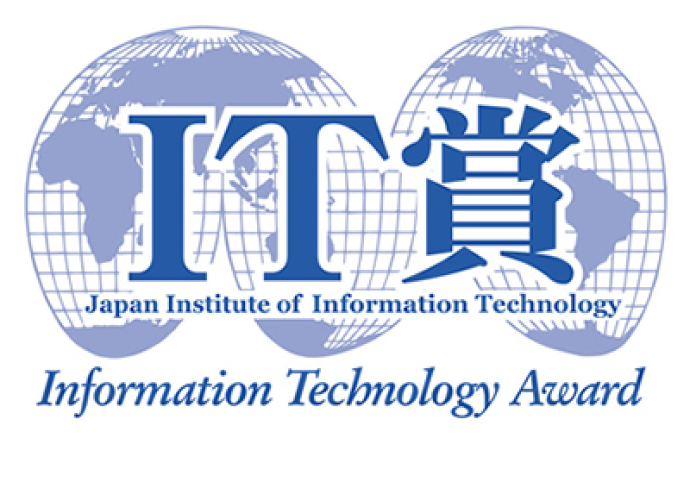
In 2015, we launched All on Maps, a platform designed to enable users to effortlessly explore data from multiple internal systems by using maps as an interface. By linking existing in-house systems and disaster and other data with the Google Maps API, we made it possible to refer to various types of information, such as elevator specifications, maintenance history, drawings, and technical data, in a secure manner, irrespective of time and place, from the icons displayed on the map to indicate the location of properties delivered by Fujitec. In 2017, we began offering the service through a smartphone app, to make it a more user-friendly tool for field work. Later, in 2019, we built a recovery support system that uses AI to advise and notify the most appropriate dispatch arrangements when a large number of elevators are shut down due to a wide-area disaster, as a means to support the reduction of post-disaster initial response and overall recovery time.
In recognition of these efforts, the Company received the FY2020 (38th) IT Award (customer and business function category), which is presented by the Japan Institute of Information Technology (JIIT).